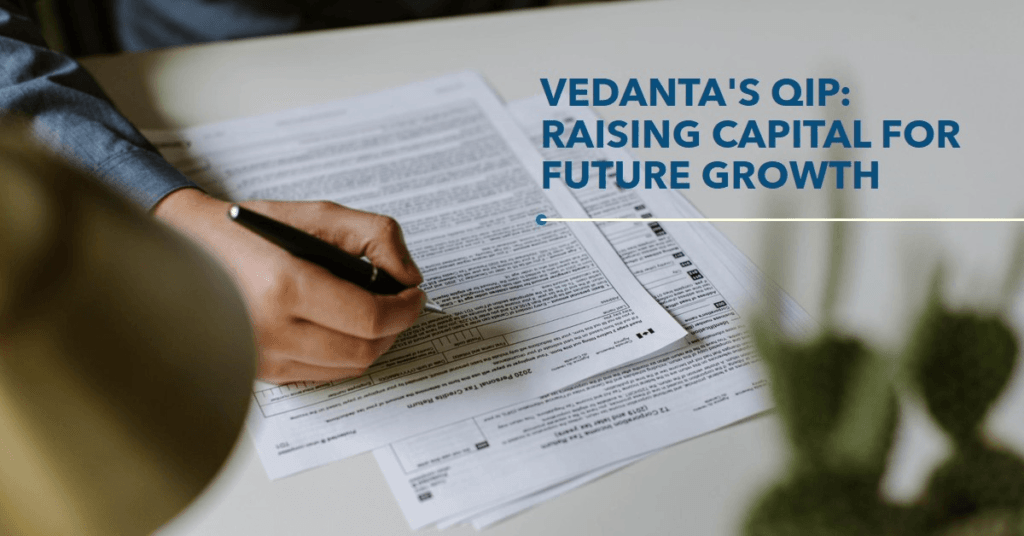Vedanta Limited, a leading Indian conglomerate spanning metals and oil sectors, has captured market attention with the launch of a Qualified Institutional Placement (QIP). This strategic maneuver signals Vedanta’s commitment to solidifying its financial foundation and fueling its future growth trajectory.
The QIP offering kicked off on July 15, 2024, setting a floor price of ₹461.26 per share. It’s noteworthy that Vedanta’s share price closed the preceding day at ₹459.40, indicating a positive market response [businesstoday.in]. This upward trend suggests investor confidence in Vedanta’s long-term prospects.
The capital raised through the QIP is expected to significantly enhance Vedanta’s financial flexibility. While the company hasn’t revealed the specific allocation of these funds, companies typically utilize QIP issuances for strategic purposes. This could include reducing debt, financing capital expenditures for expansion plans, or pursuing strategic acquisitions.
Financial analysts will be closely following the progress of the QIP. A successful offering has the potential to significantly impact Vedanta’s share price favorably. This could attract further investment and propel the company’s future endeavors. Additionally, a strong QIP performance could bolster Vedanta’s credit rating, potentially lowering borrowing costs and enhancing its financial health in the long run.
Looking beyond the immediate financial implications, the QIP also serves as a testament to Vedanta’s confidence in the Indian economy’s future. By strategically raising capital, the company positions itself to capitalize on potential growth opportunities across its diverse business segments. This could involve expanding its existing mining and oil operations, venturing into new markets, or acquiring complementary businesses.
The success of the QIP will be keenly observed by industry experts, investors, and stakeholders alike. A positive outcome could pave the way for Vedanta to solidify its position as a dominant player in the Indian resources sector and propel it towards achieving its long-term strategic goals.
What is QIP?

In the context of the article, QIP stands for Qualified Institutional Placement. It’s a capital-raising tool used by listed companies, primarily in India and Southeast Asia, to bring in new funds.
Here’s a breakdown of how it works:
- Issuing Securities: Instead of a public offering, Vedanta is issuing new shares or other convertible securities directly to qualified institutional buyers (QIBs). These are typically large financial institutions like mutual funds, insurance companies, and pension funds.
- Faster and Simpler: Unlike an IPO (Initial Public Offering), a QIP bypasses the need for extensive regulatory filings. This makes it a quicker and less bureaucratic way for companies to raise capital.
- Targeted Audience: By focusing on institutional investors, Vedanta can tap into a pool of sophisticated investors with significant investment capacity.
Overall, a QIP offers Vedanta several advantages:
- Strengthens Finances: The fresh capital can be used to pay down debt, invest in growth projects, or pursue acquisitions.
- Boosts Confidence: A successful QIP can signal investor confidence in the company, potentially leading to a higher share price.
- Improves Credit Rating: Increased financial strength can improve Vedanta’s credit rating, making it cheaper to borrow money in the future.
Why Vedanta wants to raise capital through QIP?

The article mentions that Vedanta hasn’t explicitly stated the exact allocation of the QIP funds, but there are a couple of likely reasons why they might be choosing this route:
1. Debt Reduction and Financial Restructuring:
- Vedanta might be aiming to use the capital raised through the QIP to reduce their debt burden. This can improve their financial health and free up cash flow for other strategic purposes.
- The QIP can also be a tool for financial restructuring. By issuing new equity, Vedanta can improve their debt-to-equity ratio, making them a more attractive borrower in the future and potentially lowering their borrowing costs.
2. Funding Growth Initiatives:
- The fresh capital could be used to finance capital expenditures (capex). This might involve expanding existing mining or oil operations, venturing into new geographical markets, or investing in new technologies.
- Vedanta might also be looking to use the funds for strategic acquisitions of complementary businesses, further solidifying their position in the resources sector.
Why QIP is Preferred:
There are several reasons why Vedanta might have chosen a QIP over other methods of raising capital:
- Faster and More Efficient: Compared to an IPO, a QIP is a quicker and less bureaucratic process, allowing Vedanta to access funds faster.
- Targeted Audience: By focusing on institutional investors, Vedanta can tap into a pool of large, sophisticated investors with significant investment capacity, potentially securing a larger amount of capital.
- Potential for Share Price Boost: A successful QIP can generate positive investor sentiment, potentially leading to a higher share price for Vedanta.
Overall, the QIP provides Vedanta with a strategic tool to strengthen their financial footing and fuel their growth initiatives.
Analyzing the future share price of Vedanta after the QIP is complex and depends on several factors. Here’s a breakdown of the potential impacts:
Positive Influences:
- Successful QIP: If the QIP is well-received by institutional investors and the company raises the targeted capital, it could boost investor confidence. This positive sentiment could lead to a higher share price.
- Debt Reduction: Utilizing the funds to pay down debt can improve Vedanta’s financial health. Increased profitability and a stronger balance sheet can further attract investors and potentially push the share price up.
- Growth Initiatives: Investing the capital in profitable expansion plans, strategic acquisitions, or new technologies could lead to future revenue growth for Vedanta. This improved growth outlook could translate to a higher stock valuation.
Negative Influences:
- Market Conditions: The overall health of the Indian stock market and the broader economic climate can significantly influence Vedanta’s share price. An economic downturn or negative industry trends could dampen investor enthusiasm and put downward pressure on the stock price.
- QIP Dilution: Issuing new shares through the QIP can dilute the ownership stake of existing shareholders. This could lead to a temporary decrease in share price in the short term.
- Debt Usage: If Vedanta uses the QIP funds to take on more debt, it could increase their financial risk. This might make investors wary and potentially lead to a lower share price.
Uncertainties:
- Allocation of Funds: The exact allocation of the QIP funds is unknown. How Vedanta chooses to use the capital will significantly impact the long-term trajectory of the share price.
- Commodity Prices: Vedanta’s business is heavily reliant on commodity prices like oil and metals. Fluctuations in these prices can significantly impact the company’s profitability and share price.
Overall, the future share price of Vedanta after the QIP is uncertain. While a successful QIP can be a positive catalyst, the overall market conditions, company performance, and utilization of the raised capital will ultimately determine the stock’s direction.
Here are some recommendations:
- Monitor news and announcements: Stay updated on Vedanta’s financial performance, the progress of the QIP, and any announcements regarding the allocation of funds.
- Research analyst reports: Financial analysts will likely release reports with their revised investment thesis on Vedanta after the QIP. Consider these insights for a more comprehensive perspective.
- Consider your investment horizon: If you’re a long-term investor focused on Vedanta’s growth potential, the short-term fluctuations might be less concerning. However, short-term investors should closely monitor market movements.
#epicinfinite #epicarticle #epicblog #economicinsights
What are your thoughts on Vedanta’s QIP strategy?










